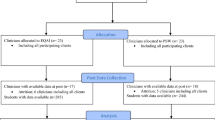Abstract
The current study evaluated why and how school mental health clinicians use standardized assessment tools in their work with youth and families. Quantitative and qualitative (focus group) data were collected prior to and following a training and consultation sequence as part of a trial program to assess school clinician’s (n = 15) experiences administering standardized tools to youth on their caseloads (n = 191). Findings indicated that, although assessment use was initially somewhat low, clinicians used measures to conduct initial assessments with the bulk of their caseloads (average = 62.2 %) during the implementation period. Clinicians also reported on factors influencing their use of assessments at the client, provider, and system levels; perceived functions of assessment; student responses to assessment use; and use of additional sources of clinically-relevant information (primarily educational data) for the purposes of assessment and progress monitoring. Implications for the contextual appropriateness of standardized assessment and training in assessment tools are discussed.
Similar content being viewed by others
References
Aarons, G. A., Green, A. E., Palinkas, L. A., Self-Brown, S., Whitaker, D. J., Lutzker, J. R., et al. (2012). Dynamic adaptation process to implement an evidence-based child maltreatment intervention. Implementation Science, 7, 1–9.
Aarons, G. A., Sommerfeld, D., & Walrath-Greene, C. (2009). Evidence-based practice implementation: The impact of public versus private sector organization type on organizational support, provider attitudes, and adoption of evidence-based practice. Implementation Science, 4, 83.
Bickman, L., Kelley, S. D., Breda, C., de Andrade, A. R., & Riemer, M. (2011). Effects of routine feedback to clinicians on mental health outcomes of youths: Results of a randomized trial. Psychiatric Services, 62, 1423–1429.
Bickman, L., Rosof-Williams, J., Salzer, M. S., Summerfelt, W. T., Noser, K., Wilson, S. J., & Karver, M. S. (2000). What information do clinicians value for monitoring adolescent client progress and outcomes? Professional Psychology, 31(1), 70–74.
Borntrager, C. F., Chorpita, B. F., Higa-McMillan, C., & Weisz, J. R. (2009). Provider attitudes toward evidence-based practices: Are the concerns with the evidence or with the manuals. Psychiatric Services, 60, 677–681.
Borntrager, C., & Lyon, A. R. (2015). Client progress monitoring and feedback in school-based mental health. Cognitive & Behavioral Practice, 22, 74–86.
Bradley, R., Danielson, L., & Doolittle, J. (2007). Responsiveness to intervention: 1997 to 2007. Teaching Exceptional Children, 39, 8–12.
Carlier, I. V., Meuldijk, D., Van Vliet, I. M., Van Fenema, E., Van der Wee, N. J., & Zitman, F. G. (2012). Routine outcome monitoring and feedback on physical or mental health status: Evidence and theory. Journal of Evaluation in Clinical Practice, 18(1), 104–110.
Chambers, D., Glasgow, R., & Stange, K. (2013). The dynamic sustainability framework: Addressing the paradox of sustainment amid ongoing change. Implementation Science, 8(1), 117.
Connors, E. H., Arora, P., Curtis, L., & Stephan, S. H. (2015). Evidence-based assessment in school mental health. Cognitive and Behavioral Practice, 22, 60–73.
Daleiden, E., & Chorpita, B. F. (2005). From data to wisdom: Quality improvement strategies supporting large-scale implementation of evidence based services. Child and Adolescent Psychiatric Clinics of North America, 14, 329–349.
DeSantis, L., & Ugarriza, D. N. (2000). The concept of theme as used in qualitative nursing research. Western Journal of Nursing Research, 22(3), 351–372.
Friese, S. (2012). ATLAS. ti 7 user manual. Berlin: ATLAS. ti Scientific Software Development GmbH.
Gance-Cleveland, B., & Yousey, Y. (2005). Benefits of a school-based health center in preschool. Clinical Nursing Research, 14, 327–342.
Garland, A. F., Kruse, M., & Aarons, G. A. (2003). Clinicians and outcome measurement: What’s the use? Journal of Behavioral Health Services & Research, 30, 393–405.
Guthrie, D., McIntosh, M., Callaly, T., Trauer, T., & Coombs, T. (2008). Consumer attitudes towards the use of routine outcome measures in a public mental health service: A consumer-driven study. International Journal of Mental Health Nursing, 17(2), 92–97.
Hatfield, D. R., & Ogles, B. M. (2004). The use of outcome measures by psychologists in clinical practice. Professional Psychology, 35, 485–491.
Hatfield, D. R., & Ogles, B. M. (2007). Why some clinicians use outcome measures and others do not. Administration and Policy in Mental Health and Mental Health Services Research, 34, 283–291.
Higa, C. K., & Chorpita, B. F. (2008). Evidence-based therapies: Translating research into practice. Handbook of evidence-based therapies for children and adolescents (pp. 45–61). New York: Springer.
Hill, C. E., Knox, S., Thompson, B. J., Nutt Williams, E., & Hess, S. A. (2005). Consensual qualitative research: An update. Journal of Counseling Psychology, 52(2), 196–205.
Hill, C. E., Thompson, B. J., & Nutt Williams, E. (1997). A guide to conducting consensual qualitative research. The Counseling Psychologist, 25(4), 517–572.
Hsieh, H. F., & Shannon, S. E. (2005). Three approaches to qualitative content analysis. Qualitative Health Research, 15, 1277–1288.
Hunsley, J., & Mash, E. J. (Eds.). (2008). A guide to assessments that work. USA: Oxford University Press.
Jensen-Doss, A. (2015). Practical, evidence-based clinical decision making: Introduction to the special series. Cognitive and Behavioral Practice, 22, 1–4.
Jensen-Doss, A., & Hawley, K. M. (2010). Understanding barriers to evidence-based assessment: Clinician attitudes toward standardized assessment tools. Journal of Clinical Child and Adolescent Psychology, 39, 885–896.
Jensen-Doss, A., & Hawley, K. M. (2011). Understanding clinicians’ diagnostic practices: Attitudes toward the utility of diagnosis and standardized diagnostic tools. Administration and Policy in Mental Health and Mental Health Services Research, 38(6), 476–485.
Kazdin, A. E. (2005). Treatment outcomes, common factors, and continued neglect of mechanisms of change. Clinical Psychology: Science and Practice, 12(2), 184–188. doi:10.1093/clipsy/bpi023.
Krueger, R. A., & Casey, M. A. (2009). Focus groups: A practical guide for applied research (4th ed.). Thousand Oaks, CA: SAGE.
Lambert, M. J., Whipple, J. L., Hawkins, E. J., Vermeersch, D. A., Nielsen, S. L., & Smart, D. W. (2003). Is it time for clinicians to routinely track patient outcome? A meta-analysis. Clinical Psychology, 10, 288–301.
Lyon, A. R., Borntrager, C., Nakamura, B., & Higa-McMillan, C. (2013a). From distal to proximal: Routine educational data monitoring in school-based mental health. Advances in School Mental Health Promotion, 6(4), 263–279.
Lyon, A. R., Charlesworth-Attie, S., Vander Stoep, A., & McCauley, E. (2011a). Modular psychotherapy for youth with internalizing problems: Implementation with therapists in school based health centers. School Psychology Review, 40, 569–581.
Lyon, A. R., Dorsey, S., Pullmann, M., Silbaugh-Cowdin, J., & Berliner, L. (2015). Clinician use of standardized assessments following a common elements psychotherapy training and consultation program. Administration and Policy in Mental Health and Mental Health Services Research,. doi:10.1007/s10488-014-0543-7.
Lyon, A. R., Ludwig, K., Romano, E., Koltracht, J., Vander Stoep, A., & McCauley, E. (2014). Using modular psychotherapy in school mental health: Provider perspectives on intervention-setting fit. Journal of Clinical Child & Adolescent Psychology, 43, 890–901.
Lyon, A. R., Ludwig, K., Romano, E., Leonard, S., Vander Stoep, A., & McCauley, E. (2013b). “If it’s worth my time, I will make the time”: School-based providers’ decision-making about participating in an evidence-based psychotherapy consultation program. Admin. Policy in Mental Health and Mental Health Services Research, 40, 467–481.
Lyon, A. R., Stirman, S. W., Kerns, S. E., & Bruns, E. J. (2011b). Developing the mental health workforce: Review and application of training approaches from multiple disciplines. Administration and Policy in Mental Health and Mental Health Services Research, 38(4), 238–253.
March, J., Parker, J., Sullivan, K., Stallings, P., & Conners, C. (1997). The Multidimensional Anxiety Scale for Children (MASC): Factor structure, reliability and validity. Journal of the American Academy of Child and Adolescent Psychiatry, 36, 554–565.
March, J. S., Sullivan, K., & Parker, J. (1999). Test-retest reliability of the Multidimensional Anxiety Scale for Children. Journal of Anxiety Disorders, 13(4), 349–358.
Mash, E. J., & Hunsley, J. (2005). Evidence-based assessment of child and adolescent disorders: Issues and challenges. Journal of Clinical Child and Adolescent Psychology, 34, 362–379.
McHugh, R. K., & Barlow, D. H. (2010). The dissemination and implementation of evidence-based psychological treatments: A review of current efforts. American Psychologist, 65(2), 73–84.
Palinkas, L. A., Aarons, G. A., Horwitz, S., Chamberlain, P., Hurlburt, M., & Landsverk, J. (2011). Mixed methods design in implementation research. Administration and Policy in Mental Health and Mental Health Services Research, 38, 44–53.
Richardson, L. P., McCauley, E., Grossman, D. C., McCarty, C. A., Richards, J., Russo, J. E., et al. (2010). Evaluation of the Patient Health Questionnaire-9 Item for detecting major depression among adolescents. Pediatrics, 126(6), 1117–1123.
Scott, K., & Lewis, C. C. (2015). Using measurement-cased dare to enhance any treatment. Cognitive and Behavioral Practice, 22, 49–59.
Spitzer, R. L., Kroenke, K., & Williams, J. B. (1999). Validation and utility of a self-report version of PRIME-MD. JAMA, 282(18), 1737–1744.
Stumpf, R. E., Higa-McMillan, C. K., & Chorpita, B. F. (2009). Implementation of evidence-based services for youth: Assessing provider knowledge. Behavior Modification, 33, 48–65.
Walker, S. C., Kearns, S., Lyon, A. R., Bruns, E. J., & Cosgrove, T. (2010). Impact of school-based health center use on academic outcomes. Journal of Adolescent Health, 46, 251–257.
Weisz, J. R., Chorpita, B. F., Palinkas, L. A., Schoenwald, S. K., Miranda, J., Bearman, S. K., et al. (2012). Testing standard and modular designs for psychotherapy treating depression, anxiety, and conduct problems in youth: A randomized effectiveness trial. Archives of General Psychiatry, 69, 274–282.
Acknowledgments
This publication was made possible in part by funding from Grant Number K08 MH095939, awarded to the first author from the National Institute of Mental Health (NIMH). The authors would also like to thank the school-based mental health provider participants, Seattle Children’s Hospital, and Public Health of Seattle and King County for their support of this project. Dr. Lyon is an investigator with the Implementation Research Institute (IRI), at the George Warren Brown School of Social Work, Washington University in St. Louis; through an award from the National Institute of Mental Health (R25 MH080916) and the Department of Veterans Affairs, Health Services Research & Development Service, Quality Enhancement Research Initiative (QUERI).
Author information
Authors and Affiliations
Corresponding author
Rights and permissions
About this article
Cite this article
Lyon, A.R., Ludwig, K., Wasse, J.K. et al. Determinants and Functions of Standardized Assessment Use Among School Mental Health Clinicians: A Mixed Methods Evaluation. Adm Policy Ment Health 43, 122–134 (2016). https://doi.org/10.1007/s10488-015-0626-0
Published:
Issue Date:
DOI: https://doi.org/10.1007/s10488-015-0626-0




